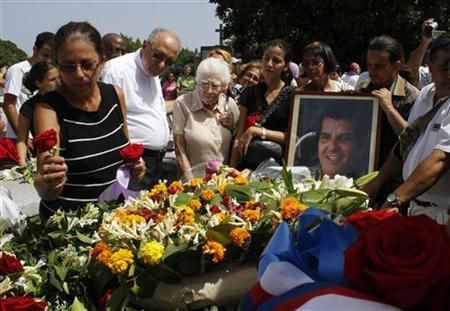
When human rights activist and founder of Cuba's Christian Liberation Movement Oswaldo Payá died in a car accident in July 2012 near the eastern Cuban city of Bayamo, Cuban police said the crash occurred when the driver lost control of the vehicle and hit a tree, killing Payá and another Cuban and injuring two foreigners who were traveling with them. Now, one of those foreigners - Spaniard Ángel Carromero, youth leader with Spain's conservative Popular Party - has broken his year-long silence on the accident by accusing agents in the Cuban government of murdering the opposition leader. "The Cuban secret service assassinated him," he told the Spanish newspaper El Mundo in an interview published on Monday.
His account contradicts comments made by Carromero in a video shortly after the accident, while he remained in custody by the Cuban authorities. "No vehicle hit us from behind," he said then. "Simply, I was driving, I struck a pothole and I took the precaution of any other driver (by applying the brakes)".
"I ask the international community to please concentrate on getting me out of here and to not use the traffic accident that could have happened to any other person for political ends."
RELATED: Assata Shakur, Cuba Fugitive, Becomes First Woman On FBI's Most Wanted List
Carromero said a "blue vehicle" began to follow the car in which he and the three other passengers were traveling. Then, he told El Mundo, the tailing vehicle began to ram into their car from behind in an attempt to drive them off the road. They succeeded, sending their car hurtling into a tree.
But according to Carromero, the impact of the crash didn't kill Payá. "I am sure that he came out of the accident alive," Carromero said. "The nurses and a parish priest assured me that all four of us were checked into the hospital."
RELATED: Beyonce, Jay-Z Cuba Visit Was Legal; Embargo Debate Reignited
The Popular Party member isn't the only one who has come out against the Cuban police's version of the events. Payá's daughter, Rosa Maria Payá, had voiced suspicion shortly after the accident about how her father died. In February, she met with Carromero in Madrid, where she says he told her a car had rammed into them from behind and knocked them off the road, and asserted after the meeting that the death of her father and Harold Cepero, the other Cuban activist traveling with them, "was not the product of an accident".
RELATED: Cuba Says 'Obsolete' Weapons Were Sent To North Korea For Repairs
At the time he spoke with Rosa Maria Payá, Carromero was in jail near Madrid. Following the accident, Cuban authorities had charged him with manslaughter and sentenced him to four years in jail. Under an agreement between Spain and Cuba which allows nationals convicted of crimes to be transported back to their country of residence to serve their prison terms, Carromero served some six months in a Spanish prison before being released on probation.
Payá was perhaps best known abroad for his 1998-2002 role in organizing the Varela Project, a petition drive calling for a referendum on political reform in Cuba which collected some 11,020 signatures. Many of his allies on the project were arrested and jailed in the 2003 government crackdown known as the "Black Spring". The New York Times wrote upon his death that he "created a new model" for activists in Cuba "with his humility, his public rejection of both American aid and the American trade embargo, and his effort to draw Cubans into the movement."
© 2025 Latin Times. All rights reserved. Do not reproduce without permission.




